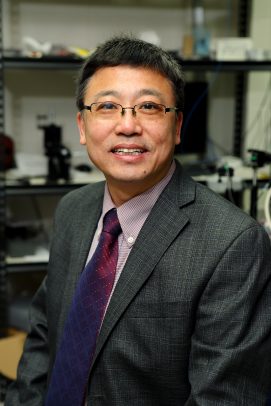University Scholar Xincheng Yao
Xincheng Yao
Richard & Loan Hill Professor of Bioengineering, Ophthalmology and Visual Sciences
4 years at UIC
What are your research interests?
Biomedical optics and instrumentation, ophthalmic imaging technology, functional imaging of retinal physiology, and retinal disease classification.
How did you become interested in these topics?
With a Ph.D. in Optics, I did my postdoctoral research in the Biophysical Group with Dr. John S. George at Los Alamos National Laboratory (LANL) and worked on the DOE retinal prosthetics project from 2004 to 2006. During the retinal prosthetics project, I learned that many patients with eye diseases suffer vision losses, affecting their life quality. Early detection and reliable treatment assessment of eye diseases relies on better technical development of imaging examination. Therefore, I decided to focus on better development of optical technology and imaging instrumentation for functional examination of retinal physiology. Recently, I have also initiated a project for supervised machine learning based AI classification of eye diseases, which holds promise for clinical deployment and telemedicine to advance the access to eye care in rural and underserved areas.
What do you teach?
At UIC I have been teaching Biomedical Optical Imaging: Principle and Application and Biomedical Instrumentation.
How do you balance teaching and research?
Typically, I am teaching one course per semester, roughly 50/50 for teaching and research. Moreover, the optical technology and instruments developed in my research lab have been integrated with my own Biomedical Optical Imaging course, and Dr. Dieter Klatt’s Bioimaging Lab course at UIC Department of Bioengineering.
What’s your advice to students who want to focus their future careers on research?
I always encourage my graduate students to identify real-world problems through reviewing literatures in the field, regularly attending scientific conferences and workshops, actively interacting with experienced clinicians. A successful scientist for multidisciplinary research in biomedical optics and instrumentation needs not only to be a good engineer for fabricating some parts, but also needs to be a good team worker to collaborate with clinicians with complementary expertise to tackle potential challenges of developing a really useful technology or device.

